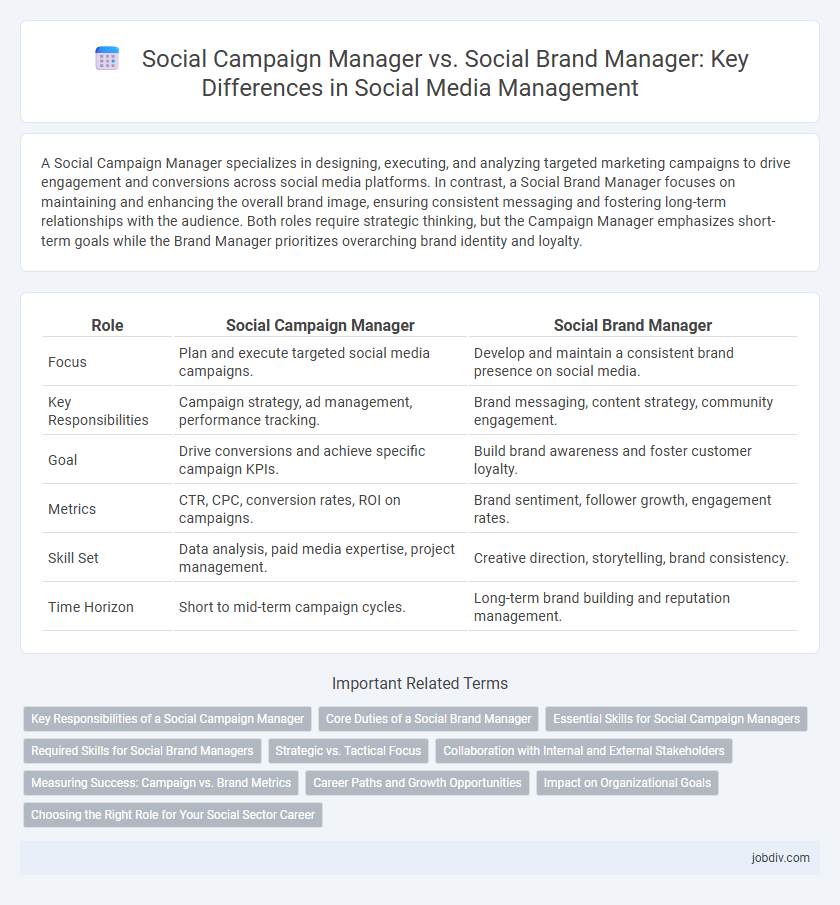A Social Campaign Manager specializes in designing, executing, and analyzing targeted marketing campaigns to drive engagement and conversions across social media platforms. In contrast, a Social Brand Manager focuses on maintaining and enhancing the overall brand image, ensuring consistent messaging and fostering long-term relationships with the audience. Both roles require strategic thinking, but the Campaign Manager emphasizes short-term goals while the Brand Manager prioritizes overarching brand identity and loyalty.
Table of Comparison
| Role | Social Campaign Manager | Social Brand Manager |
|---|---|---|
| Focus | Plan and execute targeted social media campaigns. | Develop and maintain a consistent brand presence on social media. |
| Key Responsibilities | Campaign strategy, ad management, performance tracking. | Brand messaging, content strategy, community engagement. |
| Goal | Drive conversions and achieve specific campaign KPIs. | Build brand awareness and foster customer loyalty. |
| Metrics | CTR, CPC, conversion rates, ROI on campaigns. | Brand sentiment, follower growth, engagement rates. |
| Skill Set | Data analysis, paid media expertise, project management. | Creative direction, storytelling, brand consistency. |
| Time Horizon | Short to mid-term campaign cycles. | Long-term brand building and reputation management. |
Key Responsibilities of a Social Campaign Manager
A Social Campaign Manager is responsible for planning, executing, and monitoring targeted social media campaigns to drive engagement and conversions. They analyze campaign performance metrics, optimize strategies based on data insights, and manage budgets to maximize ROI. Coordination with creative teams and timely reporting to stakeholders are critical components of their role.
Core Duties of a Social Brand Manager
A Social Brand Manager focuses on developing and maintaining a brand's identity across social media platforms by crafting consistent messaging and visual content strategies that resonate with the target audience. Core duties include overseeing brand voice alignment, managing social media campaigns to increase brand awareness, and analyzing engagement metrics to refine content strategies. This role requires close collaboration with marketing, creative teams, and external partners to ensure cohesive brand representation and customer experience.
Essential Skills for Social Campaign Managers
Social Campaign Managers excel in data analysis, strategic targeting, and budget management to optimize campaign performance across platforms like Facebook Ads and Google Analytics. Proficiency in content scheduling tools and real-time performance monitoring is essential for adapting campaigns swiftly and maximizing ROI. Mastery in audience segmentation, A/B testing, and KPI evaluation distinguishes successful Social Campaign Managers in driving engagement and conversion rates.
Required Skills for Social Brand Managers
Social Brand Managers require strong skills in brand strategy development, audience segmentation, and content creation to effectively maintain brand identity across platforms. Proficiency in data analysis tools and social listening software enables them to monitor brand sentiment and adjust campaigns accordingly. Expertise in cross-functional collaboration and storytelling enhances their ability to build emotional connections and drive long-term brand loyalty.
Strategic vs. Tactical Focus
Social Campaign Managers prioritize tactical execution by managing specific marketing initiatives, driving short-term engagement and measurable campaign results across social platforms. Social Brand Managers maintain a strategic focus, shaping the overarching brand identity, long-term goals, and consumer perception through consistent messaging and positioning. Effective social marketing requires balancing the tactical precision of campaign management with the strategic vision of brand management to optimize audience connection and brand equity.
Collaboration with Internal and External Stakeholders
Social Campaign Managers coordinate closely with marketing teams, content creators, and external agencies to execute targeted campaigns that drive engagement and conversions. Social Brand Managers collaborate with product development, customer service, and PR departments to ensure brand consistency and cultivate a cohesive brand identity across all social channels. Both roles require effective communication and alignment with stakeholders to maximize campaign impact and maintain brand integrity.
Measuring Success: Campaign vs. Brand Metrics
Social Campaign Managers focus on measuring success through specific, time-bound metrics such as engagement rates, click-through rates, conversions, and ROI on individual campaigns. Social Brand Managers prioritize long-term brand health metrics including brand awareness, sentiment analysis, follower growth, and overall brand equity. Effective measurement for Campaign Managers involves detailed analytics for immediate impact, while Brand Managers emphasize sustained brand perception and loyalty.
Career Paths and Growth Opportunities
Social Campaign Managers specialize in planning and executing targeted marketing initiatives, honing skills in analytics, audience segmentation, and performance tracking, which opens pathways to roles like Digital Marketing Director or Media Strategist. Social Brand Managers focus on cultivating brand identity and voice across platforms, developing expertise in content strategy, community engagement, and reputation management, leading to advancement as Brand Directors or Chief Marketing Officers. Both career paths offer robust growth opportunities in the evolving social media landscape, with convergence potential through cross-functional leadership positions.
Impact on Organizational Goals
A Social Campaign Manager drives targeted initiatives that boost short-term engagement metrics and direct conversion rates, aligning closely with immediate marketing objectives. In contrast, a Social Brand Manager cultivates long-term brand equity and loyalty, influencing organizational goals through sustained audience trust and perception. Both roles impact revenue growth, but the Campaign Manager emphasizes tactical execution while the Brand Manager focuses on strategic brand positioning.
Choosing the Right Role for Your Social Sector Career
Social Campaign Managers specialize in designing and executing targeted campaigns to drive engagement and conversions, emphasizing data analysis and performance metrics. Social Brand Managers focus on cultivating the overall brand identity and voice across social platforms, ensuring consistent messaging and long-term audience loyalty. Choosing between these roles depends on whether you prefer campaign-driven results or managing broader brand perception within the social sector.
Social Campaign Manager vs Social Brand Manager Infographic

 jobdiv.com
jobdiv.com